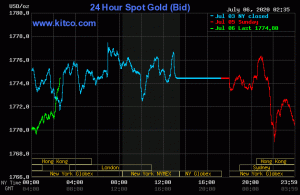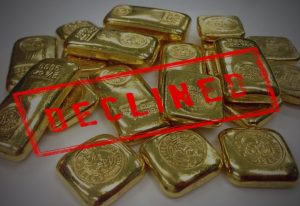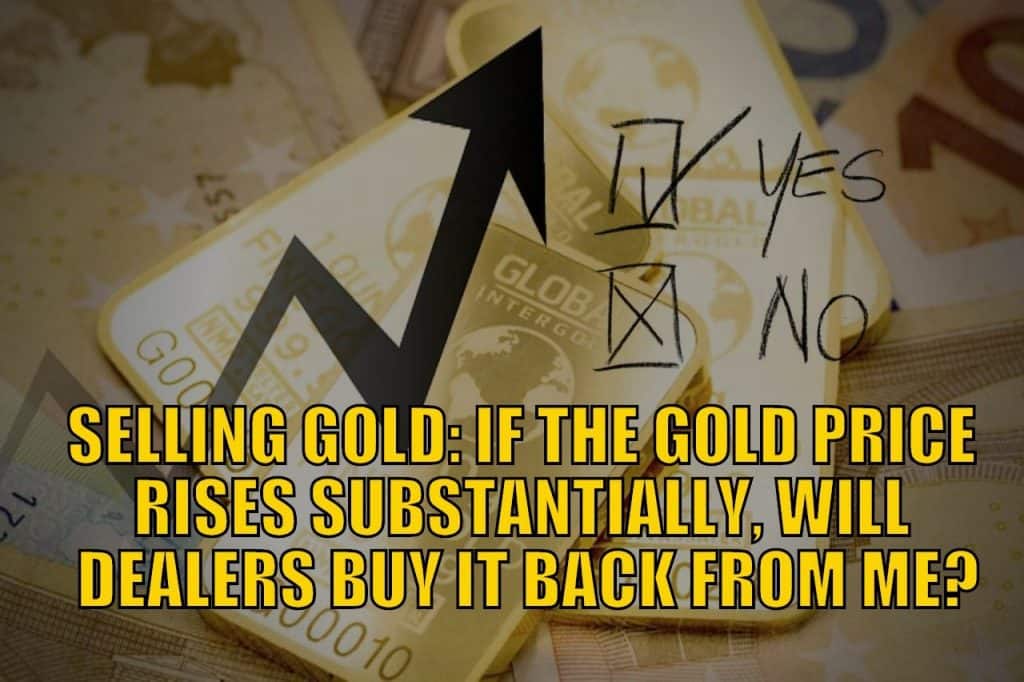Here’s two very similar questions we’ve received in the past on the topic of selling gold and what a dealer or refiner might pay for it if the price rises substantially.
The odds are you might have wondered the same thing?
Table of contents
- Question 1: Will Dealers Decline BuyBacks for Financial Reasons?
- Question 2: If the Gold Price Rises Too High – Will Dealers Offer Me Well Under Spot Price?
- Will Dealers Still Want to Buy Back Gold if the Price Rises?
- How Are Gold Prices Set?
- Would Precious Metals Dealers/Refiners Decline to Buy Back Due to Financial Reasons?
- Here’s How to Know When to Sell Gold…
Estimated reading time: 6 minutes
Question 1: Will Dealers Decline BuyBacks for Financial Reasons?
“I consider investing in gold and wanted to clarify one point with you beforehand. I did not see my question covered on your website, so I wanted to ask one of your specialists.
If selling their gold becomes a necessity for many people because of world economy reasons, how can they go about doing it?
In that scenario a large number of people will be trying to sell some of their gold investments, so the buyback points would be overrun with offers to sell them gold. Would they have to decline buyback at some stage for financial reasons.
The other aspect is that the oversupply of gold for sale would cause the price to drop significantly which defies the purpose of investing in it in the first place.”
Question 2: If the Gold Price Rises Too High – Will Dealers Offer Me Well Under Spot Price?

“I’m about to buy gold this week, first time.
Wondering if say gold goes to US$3000 and I decide to sell, can I expect close to spot price?
If I’ve decided time to sell, possibly the dealers wont be interested in buying at that stage and the best offer might be say $2000.
Could you please advise if this has to be expected?”
So 2 very similar questions. We recall also receiving questions like these in the past. So it’s high time we published an answer…
Will Dealers Still Want to Buy Back Gold if the Price Rises?
The likelihood as any crisis deepens is the exact opposite of what our readers are asking.
If an economic crisis worsens down the track, it’s likely more people will in fact be buying gold. History shows that the worse a crisis gets, the more people will turn to gold.
Also when the gold price is rising, it seems to attract more people to buy. This seems to be human nature when it comes to purchasing most investments. While we like to buy consumer items on sale, we prefer to buy investments when the price is going up!
So rather than a flood of sellers due to the price rising, we’d say it’s more likely there will be an increase in buyers of gold…
More Buyers Than Sellers in a Major Crisis

While some may be forced to sell to raise cash in a crisis, the likelihood is there will actually be more buyers than sellers. Perhaps many more buyers – which will force the price higher. This is what happened at the end of the last precious metals bull market in 1980. There were lines of people looking to buy from gold dealers – not sell.
It’s also what took place during the COVID-19 outbreak. Demand to buy increased massively. In a crisis investors will be liquidating other assets such as shares and turning to precious metals instead.
2024: More Sellers Than Buyers During Recession
But recently we have seen a real life example of many people selling. Even though the gold price has risen significantly in 2024, we have seen a surge in people selling compared to buying. Possibly due to the recession here in New Zealand and the need for some people to get some cash. However, even though there has been a lot of selling, refiners have continued to buy all gold and silver offered to them. In response to this there have at times been some deals from suppliers to offload some of this bought back gold and silver. Where they have reduced the retail price slightly. So retail margins have dipped slightly at times.
Dealers Always Want to Buy Back
But to date we have never experienced a time when gold couldn’t be sold back to refiners. (Apart from during the COVID-19 lock down when refiners were unable to operate).
It is just a matter of what price someone else is willing to pay. Globally the gold market is massive. So a refiner is always happy to buy back. Why?
Because that is how they make their money. On the spread between the buy and sell price. If they have an oversupply locally they will sell into international markets. Likewise if there is under supply they will buy raw granules from offshore for refining into bars. This is exactly what has happened in 2020 with silver. Where there was a huge surge in demand during the COVID-19 outbreak. Refiners were waiting on imports of granules of silver in order to keep up with demand.
Here’s the exact process for selling gold and silver see: Sell Gold & Silver Bullion, Bars or Coins >>
How Are Gold Prices Set?
The other way to consider this question is, how are prices set?
In simple terms if you have more buyers than sellers the price will rise. Conversely if you have more sellers than buyers, the price will fall.
So consider the example shown above where there is suddenly a surplus of people wanting to sell. Rather than refiners not wanting to buy (as suggested by our reader in question 1), they will instead choose to buy at lower prices. That is, the world “bid” price will fall. As opposed to a refiner offering only say 2/3 of the current spot price as our reader queried.
However in 2024 we have seen a different situation. With a large increase in sellers here in New Zealand, and according to our sources in many other western countries too. However in the likes of China and Japan there has been a big surge in demand to buy in 2024. So we see precious metals moving from west to east. Also as a result of eastern demand (both public and private), we have seen the price continue to rise despite many in the western world selling.
Would Precious Metals Dealers/Refiners Decline to Buy Back Due to Financial Reasons?

A fear in question one, was that dealers might be overrun with sellers and would decline to buyback at some stage for financial reasons.
Again this is very unlikely. If they buy back more than they can refine, they can sell to other refiners or sell into international markets to generate cashflow. As they make money on the spread between the buy and sell price, they will happily do this any (business) day of the year.
But as we have already pointed out, we don’t think this will happen at the peak of the crisis. Maybe instead, well after the crisis has passed, we could then see the gold price fall as people sell out of gold?
Or perhaps we see gold return to some role in the monetary system? In which case gold may not fall in price at all. Perhaps instead it could be “fixed” at a higher price?
Here’s How to Know When to Sell Gold…
The situation our readers refer to seems (to us at least), to be quite unlikely to occur. Refiners choosing not to buy back has not occurred to date.
If you’re still worried about what happens when the time comes to sell gold, then have a read of this article:
When Will You Know It’s Time to Sell Gold?
That will help you time when to sell. As explained in that post (and as mentioned above), you’ll likely be doing the exact opposite of most other people. Who will instead be looking to buy gold. So there should be no shortage of buyers for your gold. You may even garner a premium for it if you sold privately due to high demand!
Editors note: This post was first published 8 July 2020. Updated 24 July 2024 with buying and selling trend in 2024.


Pingback: Silver Break Out Beginning - Gold Survival Guide